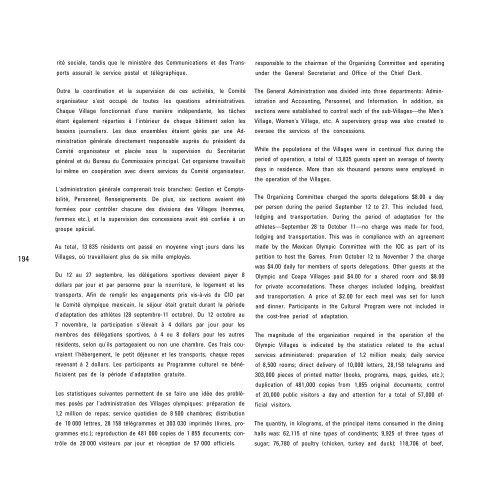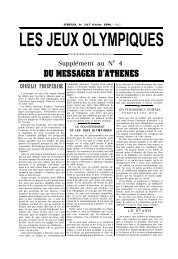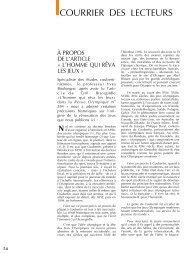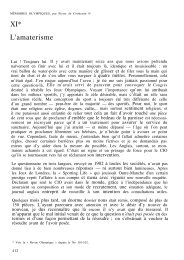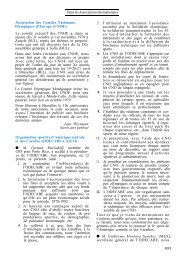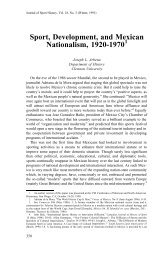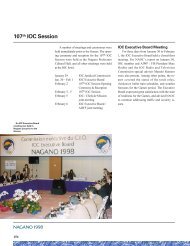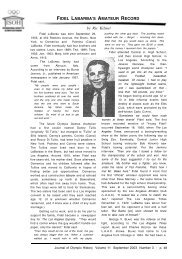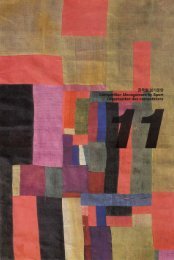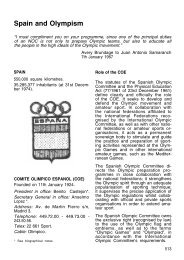Mexico City Olympic Games Official Report ... - LA84 Foundation
Mexico City Olympic Games Official Report ... - LA84 Foundation
Mexico City Olympic Games Official Report ... - LA84 Foundation
You also want an ePaper? Increase the reach of your titles
YUMPU automatically turns print PDFs into web optimized ePapers that Google loves.
194<br />
rité sociale, tandis que le ministère des Communications et des Trans-<br />
ports assurait le service postal et télégraphique.<br />
Outre la coordination et la supervision de ces activités, le Comité<br />
organisateur s'est occupé de toutes les questions administratives.<br />
Chaque Village fonctionnait d'une manière indépendante, les tâches<br />
étant également réparties à l'intérieur de chaque bâtiment selon les<br />
besoins journaliers. Les deux ensembles étaient gérés par une Ad-<br />
ministration générale directement responsable auprès du président du<br />
Comité organisateur et placée sous la supervision du Secrétariat<br />
général et du Bureau du Commissaire principal. Cet organisme travaillait<br />
lui même en coopération avec divers services du Comité organisateur.<br />
L'administration générale comprenait trois branches: Gestion et Compta-<br />
bilité, Personnel, Renseignements. De plus, six sections avaient été<br />
formées pour contrôler chacune des divisions des Villages (hommes,<br />
femmes etc.), et la supervision des concessions avait été confiée à un<br />
groupe spécial.<br />
Au total, 13 835 résidents ont passé en moyenne vingt jours dans les<br />
Villages, où travaillaient plus de six mille employés.<br />
Du 12 au 27 septembre, les délégations sportives devaient payer 8<br />
dollars par jour et par personne pour la nourriture, le logement et les<br />
transports. Afin de remplir les engagements pris vis-à-vis du CIO par<br />
le Comité olympique mexicain, le séjour était gratuit durant la période<br />
d'adaptation des athlètes (28 septembre-11 octobre). Du 12 octobre au<br />
7 novembre, la participation s'élevait à 4 dollars par jour pour les<br />
membres des délégations sportives, à 4 ou 8 dollars pour les autres<br />
résidents, selon qu'ils partageaient ou non une chambre. Ces frais cou-<br />
vraient l'hébergement, le petit déjeuner et les transports, chaque repas<br />
revenant à 2 dollars. Les participants au Programme culturel ne béné-<br />
ficiaient pas de la période d'adaptation gratuite.<br />
Les statistiques suivantes permettent de se faire une idée des problè-<br />
mes posés par l'administration des Villages olympiques: préparation de<br />
1,2 million de repas; service quotidien de 8 500 chambres; distribution<br />
de 10 000 lettres, 28 158 télégrammes et 303 030 imprimés (livres, pro-<br />
grammes etc.); reproduction de 481 000 copies de 1 855 documents; con-<br />
trôle de 20 000 visiteurs par jour et réception de 57 000 officiels.<br />
responsible to the chairman of the Organizing Committee and operating<br />
under the General Secretariat and Office of the Chief Clerk.<br />
The General Administration was divided into three departments: Admin-<br />
istration and Accounting, Personnel, and Information. In addition, six<br />
sections were established to control each of the sub-Villages—the Men's<br />
Village, Women's Village, etc. A supervisory group was also created to<br />
oversee the services of the concessions.<br />
While the populations of the Villages were in continual flux during the<br />
period of operation, a total of 13,835 guests spent an average of twenty<br />
days in residence. More than six thousand persons were employed in<br />
the operation of the Villages.<br />
The Organizing Committee charged the sports delegations $8.00 a day<br />
per person during the period September 12 to 27. This included food,<br />
lodging and transportation. During the period of adaptation for the<br />
athletes—September 28 to October 11—no charge was made for food,<br />
lodging and transportation. This was in compliance with an agreement<br />
made by the Mexican <strong>Olympic</strong> Committee with the IOC as part of its<br />
petition to host the <strong>Games</strong>. From October 12 to November 7 the charge<br />
was $4.00 daily for members of sports delegations. Other guests at the<br />
<strong>Olympic</strong> and Coapa Villages paid $4.00 for a shared room and $8.00<br />
for private accomodations. These charges included lodging, breakfast<br />
and transportation. A price of $2.00 for each meal was set for lunch<br />
and dinner. Participants in the Cultural Program were not included in<br />
the cost-free period of adaptation.<br />
The magnitude of the organization required in the operation of the<br />
<strong>Olympic</strong> Villages is indicated by the statistics related to the actual<br />
services administered: preparation of 1.2 million meals; daily service<br />
of 8,500 rooms; direct delivery of 10,000 letters, 28,158 telegrams and<br />
303,000 pieces of printed matter (books, programs, maps, guides, etc.);<br />
duplication of 481,000 copies from 1,855 original documents; control<br />
of 20,000 public visitors a day and attention for a total of 57,000 of-<br />
ficial visitors.<br />
The quantity, in kilograms, of the principal items consumed in the dining<br />
halls was: 62,115 of nine types of condiments; 9,925 of three types of<br />
sugar; 76,780 of poultry (chicken, turkey and duck); 118,706 of beef,


